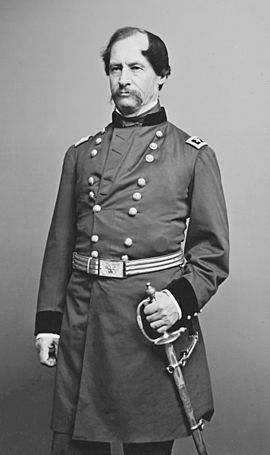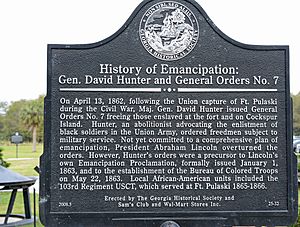David Hunter facts for kids
Quick facts for kids
David Hunter
|
|
|---|---|
 |
|
| Nickname(s) | "Black Dave" |
| Born | July 21, 1802 Troy, New York, U.S. |
| Died | February 2, 1886 (aged 83) Washington, D.C., U.S. |
| Buried |
Princeton Cemetery, Princeton, New Jersey, U.S.
|
| Allegiance | |
| Service/ |
|
| Years of service | 1822–1836; 1841–1866 |
| Rank | |
| Commands held | Department of Kansas Department of the West Department of the South |
| Battles/wars | |
David Hunter (born July 21, 1802 – died February 2, 1886) was an American military officer. He became a general for the Union Army during the American Civil War. He is known for a few important things.
First, he issued an order in 1862 to free enslaved people in three Southern states. This order was quickly cancelled by President Abraham Lincoln. Second, he led Union troops during the Valley campaigns of 1864. Third, he was the head of the military court that tried the people involved in President Lincoln's assassination.
Contents
Early Life and Military Training
David Hunter was born in either Troy, New York, or Princeton, New Jersey. His grandfather, Richard Stockton, was one of the people who signed the United States Declaration of Independence.
Hunter graduated from the United States Military Academy at West Point in 1822. He became a second lieutenant in the 5th U.S. Infantry Regiment. He served in the army for 11 years. In 1833, he was promoted to captain.
He left the army in 1836 and moved to Illinois. There, he worked with land sales. In 1841, he rejoined the army as a paymaster, handling money. He was promoted to major in 1842. He may have fought in the Second Seminole War and the Mexican–American War.
In 1860, Hunter was stationed in Fort Leavenworth, Kansas. He started writing letters to Abraham Lincoln. Hunter strongly believed that slavery was wrong. Because of this connection, Lincoln invited Hunter to ride on his special train in 1861. This train took Lincoln from Springfield, Illinois, to Washington, D.C., for his inauguration as president. During this trip, Hunter hurt his collarbone in a large crowd.
Hunter's Role in the Civil War
Soon after the war began at Fort Sumter, Hunter was promoted to colonel. Just three days later, he became a brigadier general of volunteers. He commanded a group of soldiers in Washington.
He was wounded in the neck and face at the First Battle of Bull Run in July 1861. In August, he was promoted again to major general of volunteers. He later commanded the Western Department. Then, he was moved to the Department of Kansas. In March 1862, he was transferred to lead the Department of the South.
General Order No. 11: Freeing Enslaved People
Hunter strongly believed that black men should be allowed to fight as soldiers for the Union. After the Siege of Fort Pulaski, where black Union soldiers showed great courage, Hunter began enlisting black men from South Carolina. He created the first Union Army regiment made up of black soldiers. It was called the 1st South Carolina (African Descent). At first, he was told to stop, but Congress later approved his actions.
Hunter caused another big stir when he issued an order to free enslaved black people. This order applied to Georgia, South Carolina, and Florida. He declared that slavery and military law could not exist together. He said that enslaved people in these states were "forever free."
President Abraham Lincoln quickly cancelled Hunter's order. Lincoln was worried about how this would affect the border states. These states allowed slavery but had stayed with the Union. Lincoln wanted to keep them from joining the Confederacy. He preferred a slower approach to freeing slaves.
However, the country was quickly turning against slavery. Lincoln himself later issued the Emancipation Proclamation in 1863. This proclamation freed enslaved people in Confederate states. Confederate President Jefferson Davis was very angry about Hunter's order. He ordered that Hunter be treated as a "felon to be executed if captured."
The Valley Campaign and "Scorched Earth"
In 1864, Hunter was ordered to lead Union troops into the Shenandoah Valley. This area in Virginia was important for farming and railroads. The goal was to hurt the Confederate economy. Hunter was told to use "scorched earth" tactics. This meant destroying things that could help the Confederate army.
On June 5, Hunter won a battle at Battle of Piedmont. He then moved through the Valley, destroying military targets. His troops burned down the Virginia Military Institute (VMI) on June 11. This was because VMI cadets had fought against Union soldiers. Hunter also ordered the home of former governor John Letcher to be burned.
Hunter's campaign in the Valley ended after he was defeated at the Battle of Lynchburg on June 19. After this battle, Hunter's army retreated into West Virginia. This took his army out of the fight for a few weeks. This allowed Confederate General Jubal Early to move freely in the Valley.
Hunter always argued that his retreat was a smart move. However, General Robert E. Lee, a Confederate leader, later said that Hunter's retreat had been very helpful to the Confederate cause.
The burning of VMI and other destruction angered the Confederates. General Early described the damage as "heart-rending." Houses were burned, and families were left without food or shelter. Belongings were destroyed, and people were robbed.
On August 1, General Ulysses S. Grant put General Philip Sheridan in charge of fighting Jubal Early. Hunter was still in command of the military department on paper. However, he decided to give full control to Sheridan. Hunter was then relieved of his combat command. He was promoted to brevet major general in 1865. This was an honorary rank given to many senior officers late in the war.
Later Life and Legacy
After the war, David Hunter was part of the honor guard at Abraham Lincoln's funeral. He also led the military court that tried the people involved in Lincoln's assassination. He retired from the army in July 1866. He wrote a book about his military service called Report of the Military Services of Gen. David Hunter, U.S.A., during the War of the Rebellion, published in 1873.
Hunter died in Washington, D.C., and is buried in Princeton Cemetery in Princeton, New Jersey.
In Popular Culture
- The actor Colm Meaney played David Hunter in the 2011 movie The Conspirator.
Images for kids
 | Georgia Louise Harris Brown |
 | Julian Abele |
 | Norma Merrick Sklarek |
 | William Sidney Pittman |



